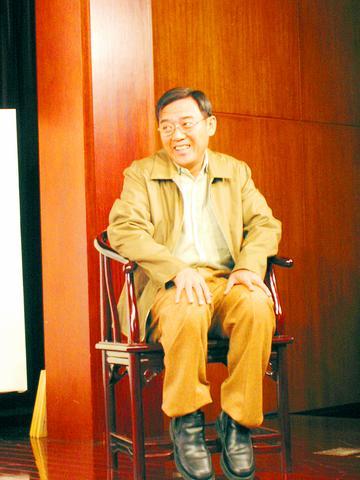The upcoming performance of Yasmina Reza's 1994 play Art by the Godot Theater Company has turned out to be something of a coup de theatre. Opening on Dec. 25 and originally scheduled for 16 performances in Taipei -- a long run by local standards. Tickets for the first seven performances are booked solid and only the most expensive remain for the rest.
Godot announced Tuesday that it would be returning for an additional six shows in Taipei in February after it has completed its countrywide tour. Tickets for these additional performances are also selling fast.

PHOTO: IAN BARTHOLOMEW, TAIPEI TIMES
Why the enthusiasm?
While Yasmina Reza has made something of a sensation in Europe and the US, she is a long way from theatrical greatness and while most reviews acknowledge her accessibility, they are also just a tad dismissive. A review in the British magazine The Spectator describes her as "intellectual theater lite."
While Art won the Moliere Award for Best Play, Best Production, and Best Author when it was first released, and has since proved popular in numerous translated productions, the real draw for Godot's production is that it features three of Taiwan's most distinguished comedians in a virtuoso peace of ensemble work.
The play has a cast of only three; but when these are Ku Bao-ming (
Each actor brings his own unique style to the show, and as director Liang Chih-ming (
The story is simple enough: Art is about the relationship between three friends, one who has bought an expensive modernist work. One of his friends despises him for this while the other tries to make peace between the two. What follows is a machine-gun battle of words, which is excruciatingly funning in its own right and is all the cleverer for the fact that most of the action is in the subtext. The modernist art work at the center of the debate serves merely as a catalyst for the three friends to assess their relationship -- hence the accusation of being "intellectual theater lite," for while it has pretensions to the high-brow, it is not rigorously intellectual.
While nobody will deny that Taiwan has theatrical talent, its perennial problem has been a lack of depth that tends to mar ambitious projects such as Ping-Fong's recent Wedding Memories, in which the stars absolutely overwhelm the rest of the cast. The small scale of the current production and the decision to cast three of the most highly sought after actors -- rather than letting one big name carry the publicity load for two lesser names -- has provided an opportunity to see some top-class action on stage.

The 2018 nine-in-one local elections were a wild ride that no one saw coming. Entering that year, the Chinese Nationalist Party (KMT) was demoralized and in disarray — and fearing an existential crisis. By the end of the year, the party was riding high and swept most of the country in a landslide, including toppling the Democratic Progressive Party (DPP) in their Kaohsiung stronghold. Could something like that happen again on the DPP side in this year’s nine-in-one elections? The short answer is not exactly; the conditions were very specific. However, it does illustrate how swiftly every assumption early in an

Francis William White, an Englishman who late in the 1860s served as Commissioner of the Imperial Customs Service in Tainan, published the tale of a jaunt he took one winter in 1868: A visit to the interior of south Formosa (1870). White’s journey took him into the mountains, where he mused on the difficult terrain and the ease with which his little group could be ambushed in the crags and dense vegetation. At one point he stays at the house of a local near a stream on the border of indigenous territory: “Their matchlocks, which were kept in excellent order,

Jan. 19 to Jan. 25 In 1933, an all-star team of musicians and lyricists began shaping a new sound. The person who brought them together was Chen Chun-yu (陳君玉), head of Columbia Records’ arts department. Tasked with creating Taiwanese “pop music,” they released hit after hit that year, with Chen contributing lyrics to several of the songs himself. Many figures from that group, including composer Teng Yu-hsien (鄧雨賢), vocalist Chun-chun (純純, Sun-sun in Taiwanese) and lyricist Lee Lin-chiu (李臨秋) remain well-known today, particularly for the famous classic Longing for the Spring Breeze (望春風). Chen, however, is not a name

There is no question that Tyrannosaurus rex got big. In fact, this fearsome dinosaur may have been Earth’s most massive land predator of all time. But the question of how quickly T. rex achieved its maximum size has been a matter of debate. A new study examining bone tissue microstructure in the leg bones of 17 fossil specimens concludes that Tyrannosaurus took about 40 years to reach its maximum size of roughly 8 tons, some 15 years more than previously estimated. As part of the study, the researchers identified previously unknown growth marks in these bones that could be seen only